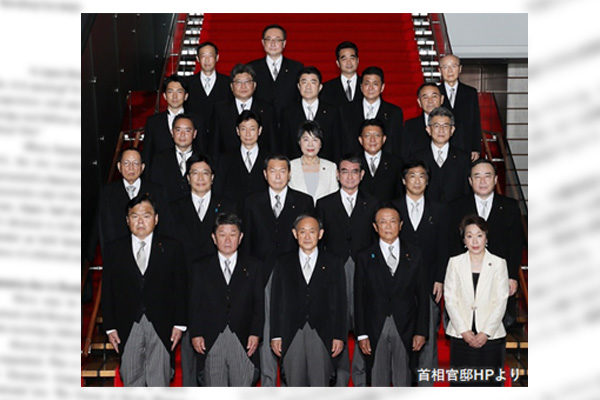New Japanese Prime Minister Yoshihide Suga has got a good start as his commonplace words of “working for the people” and “implementing policies speedily” have become popular, even with Suga-related products being launched. Frankly, however, I am concerned that Suga, as well as Shigeru Ishiba and Fumio Kishida who competed with Suga for the presidency of the ruling Liberal Democratic Party, lacks a national vision. Anyone cannot develop a national vision without finding Japan’s accurate position in the international arena.
I felt it was abnormal that reporters raised no question about foreign or defense policy in a debate among the three LDP presidential candidates at the Japan National Press Club. On newspapers and television in a run-up to the election, the candidates failed to provide any comprehensive view about the international situation. Among the Group of Seven industrial countries, Japan may be the only nation where domestic issues alone are discussed when its top leader is elected.
“Yoshida Doctrine” vs. “normal country” theory
Suga’s predecessor Shinzo Abe has had a clear national vision. When launching his first administration, he advocated a “breakaway” from the postwar regime which is nothing other than the Japanese constitution enforced after World War II. Abe’s call for constitutional amendment originates from this argument. In December 2013 one year after the inauguration of his second administration, and on September 19 this year, just after his resignation as prime minister, Abe visited Yasukuni Shrine to pray for those who sacrificed their lives for the country. The three LDP presidential candidates never mentioned Yasukuni Shrine. Will Prime Minister Suga find an opportunity to visit the shrine? If not, he would be viewed as taking care not to arouse China.
The late Yonosuke Nagai, a professor emeritus at the Tokyo Institute of Technology, named Japan’s postwar policy as “Yoshida Doctrine.” Japan has followed a “lightly armed economic power” path while refusing to rearm itself in defiance of a U.S. request. The doctrine was named after Shigeru Yoshida, one of Japan’s representative postwar prime ministers, although Yoshida himself was not directly involved in the policy. The doctrine is still widely shared among politicians, business leaders, bureaucrats and journalists in Japan. While whether the Yoshida Doctrine can work now has become doubtful due to dramatic changes in the international situation, even some LDP lawmakers still oppose constitutional amendment because of the long-standing doctrine. Irrespective of whether it is right or not, the Yoshida Doctrine represents a national vision.
During the 1991 Persian Gulf War, Japan made nothing more than financial contributions to war efforts while depending on Persian Gulf nations for 80% of its oil consumption. Regretting for the episode, Ichiro Ozawa advocated a “normal country” theory, asserting that Japan should become like other normal democratic countries that cooperated with the United States in the Gulf War. This theory also represents a national vision. Ozawa’s later behavior has deviated from the vision, but the vision still stands. Abe for his part has described his splendid national vision in his book titled “Towards a Beautiful Country.”
Lead G7 discussions
I give high ratings to the Suga administration’s agile efforts to lower mobile phone charges to be considerate of the people and launch a digitalization agency. In the future, however, Suga would have to bring up issues people don’t want to hear. There are mountains of foreign and defense policy issues that do not attract voters immediately. If Suga leads G7 summit discussions on global issues, his national vision would naturally become clear.
Tadae Takubo is Vice President of Japan Institute for National Fundamentals and a professor emeritus at Kyorin University


